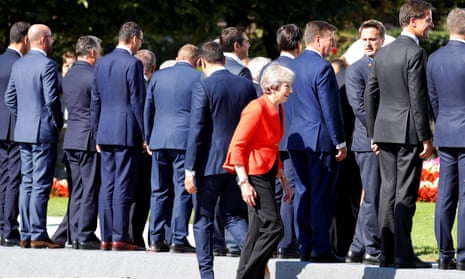Theresa May has only herself to blame for the Brexit shambles that threatens to collapse her premiership. It’s true that some EU leaders, notably Emmanuel Macron, were pursuing their own, unhelpful agendas at last week’s meeting in Salzburg. France’s president is in deepening trouble at home. But he casts himself as a big man in Europe and Macron was keen to show what happens when politicians let themselves to be dragged along by the populist tide. Mrs May made herself an easy target.
Quick GuideThe Observer
Show
The Observer is the world's oldest Sunday newspaper, founded in 1791. It is published by Guardian News & Media and is editorially independent.
It’s also true that Angela Merkel, Germany’s wounded chancellor, is not the dominant figure she once was. Mrs Merkel has her own problems with fractious Bavarian rightwingers and racist xenophobes. Along with Germany’s exporters, she would like Brexit to be settled amicably. But she is not prepared to risk the integrity of the EU single market and customs union, on which her country’s prosperity largely depends. Mrs Merkel has tried to help, but she does not have much spare political capital to rescue Mrs May from mistakes of her own making.
It is certainly the case that Donald Tusk, president of the council of ministers, caught Mrs May unawares with his blunt declaration that her Chequers plan was unworkable. For the past two years, Mr Tusk has played good cop to bad cop Michel Barnier, the chief EU negotiator. But while Mr Tusk is an anglophile, he is also an ardent believer in the European project, as befits a former Polish prime minister. He has been a candid friend to Mrs May, but he could not force her to listen, so in the end he mockingly cast her adrift.
A similar evolution appears to have affected the thinking of countries such as Denmark, the Netherlands, Finland, Sweden, Poland and the Baltic states that most regret the UK’s decision to leave and instinctively support Mrs May’s aim of maintaining a “deep and special relationship”. Some of their leaders, notably Hungary’s Viktor Orbán, are themselves less than enamoured of what they consider to be the Brussels juggernaut. But their actions are ultimately dictated by an informed and pragmatic understanding of where their national interest lies – inside a well-functioning union. Sadly, the same cannot be said of Mrs May.
It is only too typical, and predictable, that hard Tory Brexiters should petulantly decry perfidious Europeans. Their default position is always to blame the EU, especially when it exposes their own irresponsibility and lack of foresight. Perhaps Mr Macron should not have called them “liars”. But what word would you use to describe the fatuous and misleading claims made by Boris Johnson and others before the 2016 referendum?
Mrs May is now in a dreadful predicament. So, too, is the country. And for this sorry state of affairs, it is the prime minister – not the EU27, not Mr Tusk or Jean-Claude Juncker, not Mr Barnier, not even her incompetent ministers and advisers – who is ultimately to blame. Mrs May, after all, willingly grabbed the job of leading the UK out of Europe, even though she personally voted Remain. It was Mrs May, at Lancaster House, who set a series of rigid “red lines” that she should have known were impractical and unsustainable, as we have said here many times.
From the start, EU leaders insisted no cherrypicking of withdrawal terms would be allowed. But Mrs May ignored them. The complex issues raised by the Northern Ireland border were flagged up early on. But only in recent months, to the profound frustration of the Irish government, have Mrs May and her cabinet taken this question seriously – and she still lacks a solution. EU officials complain, with justice, that her inflexible negotiating stance revealed an ignorant disregard, or lack of understanding, of the basic principles upon which the EU is based, namely the single market, free movement of people and goods and a common regulatory and legal framework.
Mrs May’s Brexit strategy never recovered from that false start. Misjudgment was piled upon misjudgment, error upon unforced error. Even as David Davis, the former Brexit secretary, retreated on issue after issue, Mrs May clung to the illusion that the EU27, more powerful and more united than Britain, would somehow eventually cave in. Her attempts during the summer to foment divisions came to nothing, while causing great resentment. Provocative, too, was her effort to make Mr Barnier the villain of the piece. Licking her wounds after Salzburg, Mrs May claimed she had always shown the EU respect, but these tactics were disrespectful.
Perhaps the most startling aspect of Mrs May’s performance last week was that the EU leaders’ multiple rebuffs clearly took her by surprise. Why so? They were merely reiterating positions they have maintained for the past two years or more. Does she now, finally, grasp the evidence of her own eyes and ears? Does she understand her Chequers plan, rejected at home and abroad, is doomed? And does she really still believe a no-deal outcome could be anything other than a catastrophe? Judging by Friday’s negative, aggressive Downing Street statement, she remains in denial. She has learned nothing – and has absolutely nothing new to offer. Mrs May is in a very deep hole, but she will not stop digging.
